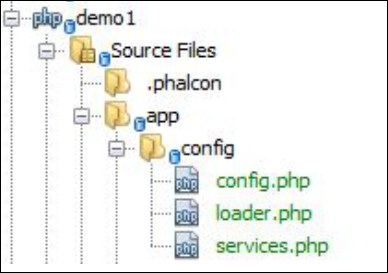The config folder of the web application includes the following files −

Basically, services.php file inside the config folder acts as a container of all services. This interface helps in initializing all the services like database connection, setting up cookies, creating a new session, or connecting with NoSQL database.

config.php
It includes the configurations for database connectivity and routing as per the directory path.<?php /* * Modified: preppend directory path of current file, because of this file own different ENV under between Apache and command line. * NOTE: please remove this comment. */ defined('BASE_PATH') || define('BASE_PATH', getenv('BASE_PATH') ?: realpath(dirname(__FILE__) . '/../..')); defined('APP_PATH') || define('APP_PATH', BASE_PATH . '/app'); return new \Phalcon\Config([ 'database' => [ 'adapter' => 'Mysql', 'host' => 'localhost', 'username' => 'root', 'password' => '', 'dbname' => 'test', 'charset' => 'utf8', ], 'application' => [ 'appDir' => APP_PATH . '/', 'controllersDir' => APP_PATH . '/controllers/', 'modelsDir' => APP_PATH . '/models/', 'migrationsDir' => APP_PATH . '/migrations/', 'viewsDir' => APP_PATH . '/views/', 'pluginsDir' => APP_PATH . '/plugins/', 'libraryDir' => APP_PATH . '/library/', 'cacheDir' => BASE_PATH . '/cache/', 'baseUri' => '/demo1/', ] ]);
loader.php
It extends the existing class of \Phalcon\Loader(). The loader class registers the directories which requires web application.<?php $loader = new \Phalcon\Loader(); /** * We're a registering a set of directories taken from the configuration file */ $loader->registerDirs( [ $config->application->controllersDir, $config->application->modelsDir ] )->register();
services.php
This file associates all the functions which implement the services of a web project. It implements Phalcon\Di interface. It also implements a dependency injection of the services by loading them.Basically, services.php file inside the config folder acts as a container of all services. This interface helps in initializing all the services like database connection, setting up cookies, creating a new session, or connecting with NoSQL database.
<?php use Phalcon\Mvc\View; use Phalcon\Mvc\View\Engine\Php as PhpEngine; use Phalcon\Mvc\Url as UrlResolver; use Phalcon\Mvc\View\Engine\Volt as VoltEngine; use Phalcon\Mvc\Model\Metadata\Memory as MetaDataAdapter; use Phalcon\Session\Adapter\Files as SessionAdapter; use Phalcon\Flash\Direct as Flash; /** * Shared configuration service */ $di->setShared('config', function () { return include APP_PATH . "/config/config.php"; }); /** * The URL component is used to generate all kind of urls in the application */ $di->setShared('url', function () { $config = $this->getConfig(); $url = new UrlResolver(); $url->setBaseUri($config->application->baseUri); return $url; }); /** * Setting up the view component */ $di->setShared('view', function () { $config = $this->getConfig(); $view = new View(); $view->setDI($this); $view->setViewsDir($config->application->viewsDir); $view->registerEngines([ '.volt' => function ($view) { $config = $this->getConfig(); $volt = new VoltEngine($view, $this); $volt->setOptions([ 'compiledPath' => $config->application->cacheDir, 'compiledSeparator' => '_' ]); return $volt; }, '.phtml' => PhpEngine::class ]); return $view; }); /** * Database connection is created based in the parameters defined in the configuration file */ $di->setShared('db', function () { $config = $this->getConfig(); $class = 'Phalcon\Db\Adapter\Pdo\\' . $config->database->adapter; $connection = new $class([ 'host' => $config->database->host, 'username' => $config->database->username, 'password' => $config->database->password, 'dbname' => $config->database->dbname, 'charset' => $config->database->charset ]); return $connection; });

No comments:
Post a Comment